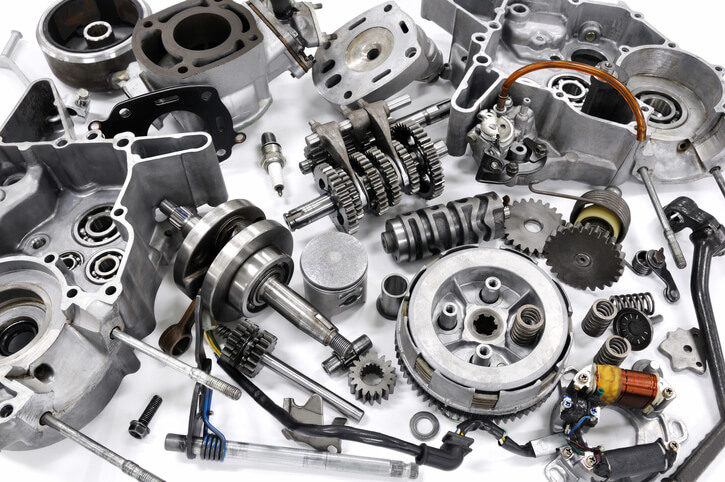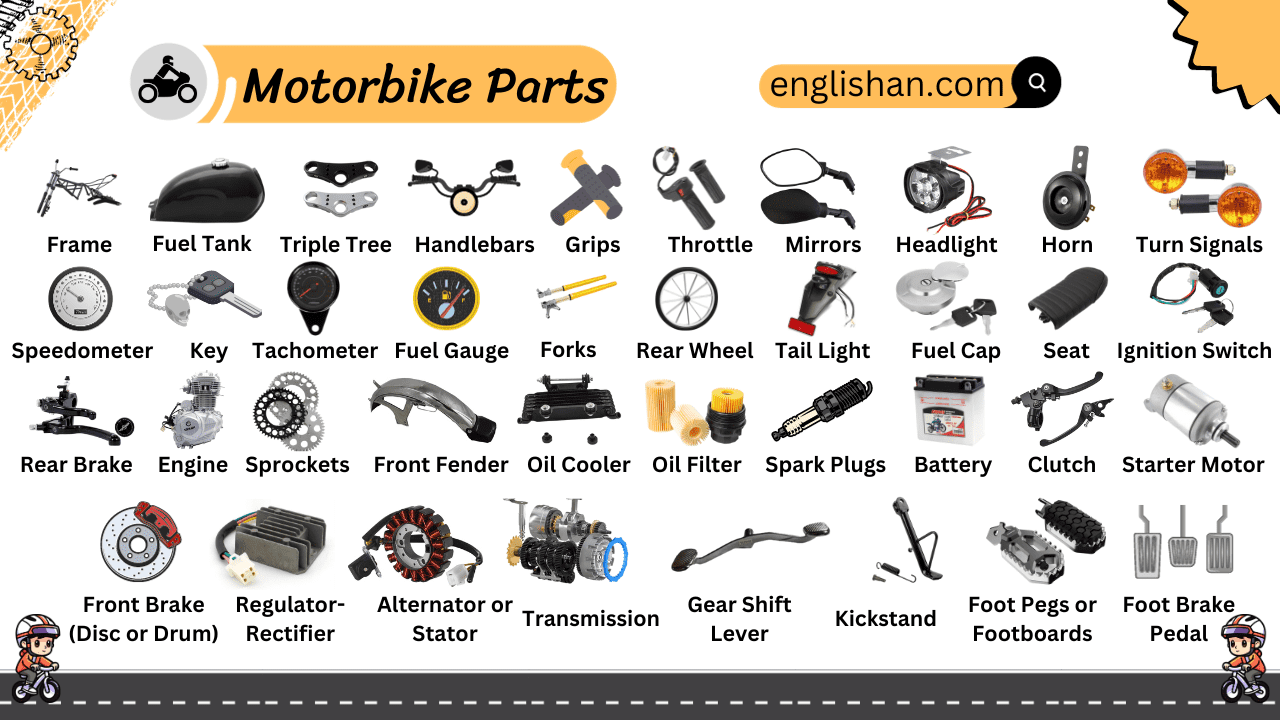Troubleshooting Common Issues in Your OEM Parts New Zealand Setup
Troubleshooting Common Issues in Your OEM Parts New Zealand Setup
Blog Article
Discover the Vital MotorBike Components You Need for Ideal Efficiency
Understanding the crucial parts of a motorbike is basic for achieving peak performance. Each element, from the engine to the stopping system, plays a crucial function in general capability and safety. Routine upkeep can protect against unexpected failures and improve the riding experience. Nonetheless, many bikers ignore the details of these systems. Uncovering just how they interact can cause a much more efficient experience. What critical components should every biker prioritize?
The Engine: The Heart of Your Motorcycle
The engine serves as the core component of a motorcycle, driving its performance and defining its capabilities. It is in charge of transforming gas right into mechanical power, which powers the bike onward. Numerous kinds of engines are utilized, including single-cylinder, V-twin, and inline configurations, each offering distinct characteristics suited for various riding designs and functions. The engine size, typically measured in cubic centimeters (cc), considerably affects efficiency, with larger engines generally providing even more power and torque.Furthermore, the engine's style and innovation, such as fuel injection systems or air-cooling versus liquid-cooling, influence effectiveness and dependability. Maintenance is essential for peak procedure; aspects like regular oil adjustments and monitoring ignition system warranty longevity. Bikers often think about an engine's responsiveness and smoothness, as these qualities enhance the general riding experience. Ultimately, the engine continues to be a critical element that specifies not just the bike's performance but likewise the rider's link to the device.
The Transmission: Changing Gears Efficiently
The transmission plays a vital role in a motorcycle's performance, especially in the mechanics of equipment changing. Comprehending just how to move equipments efficiently can improve the general riding experience, while routine maintenance assurances peak performance. Appropriate focus to these aspects can substantially impact the long life and efficiency of the motorbike.

Equipment Shifting Mechanics
Smooth gear changing is vital for perfect motorbike efficiency, significantly affecting both velocity and control. The auto mechanics of equipment changing entail the interaction in between the clutch, equipment lever, and transmission system. When a motorcyclist engages the clutch, it disengages the engine from the transmission, permitting an equipment change without damaging the elements. A well-timed launch of the clutch, incorporated with specific movement of the gear bar, facilitates a smooth change between gears. This procedure assures that the engine runs within its best power band, improving performance. Motorcycle Spares Christchurch. Additionally, comprehending the equipment proportions and their result on speed and torque can help motorcyclists make educated choices during shifts, eventually adding to a much more enjoyable and responsive riding experience
Maintenance Tips Importance
Routine maintenance plays a vital function in ensuring that the transmission system operates effectively, permitting smooth equipment changes. Consistently altering the transmission and inspecting fluid is important, as old fluid can result in enhanced friction and wear. In addition, inspecting the clutch for wear warranties peak involvement and disengagement, protecting against slippage throughout equipment changes. Lubrication of moving components is similarly essential to decrease rubbing and boost efficiency. Motorcycle proprietors must likewise keep an eye on for leaks and uncommon sounds, as these can indicate underlying issues. By adhering to these upkeep suggestions, bikers can prolong the life-span of their transmission system, ensuring that gear changes remain smooth and adding to the overall efficiency of their motorbike.
The Braking System: Ensuring Safety And Security on Every Experience
Braking systems are fundamental parts that straight influence a motorcycle's safety and efficiency. They contain numerous parts, consisting of brake pads, rotors, calipers, and hydraulic lines, all interacting to guarantee effective deceleration. The kind of stopping system-- usually either disc or drum-- affects responsiveness and quiting power.Regular maintenance is important to support peak efficiency; worn brake pads can cause decreased performance and enhanced quiting distances. Furthermore, the quality of brake fluid need to be kept an eye on, as it can soak up moisture gradually, compromising braking efficiency.Riders need to likewise take into consideration the value of anti-lock stopping systems (ABDOMINAL), which protect against wheel lockup during abrupt quits, boosting general safety and security. Correctly operating brakes are not practically quiting; they infuse confidence in the biker, permitting for safer navigation with numerous surfaces. Ultimately, a reliable braking system is critical for taking pleasure in every adventure with tranquility of mind.
The Suspension: Enhancing Comfort and Control
A well-functioning shock absorber greatly contributes to a motorcycle's total performance, matching the efficiency of the braking system. The suspension plays a significant role in absorbing shocks from irregular article source surface areas, ensuring a smoother trip while preserving tire contact with the road. This contact is essential for both security and control, enabling cyclists to browse corners with confidence and precision.Different sorts of shock absorber, such as telescopic forks or mono-shocks, provide varying degrees of convenience and handling. Correctly tuned suspension enhances responsiveness, providing the cyclist with an extra connected feel to the motorcycle. Routine maintenance checks are very important to identify the suspension elements, including springs and dampers, are working at their best. A reliable suspension system not only boosts the riding experience but additionally adds to the longevity of various other motorbike components by lessening wear and tear. Therefore, purchasing quality suspension is crucial for any significant motorbike fanatic.
The Tires: Linking You to the Road
Tires play a necessary role in a motorcycle's performance, functioning as the primary link in between the motorcyclist and the roadway. Understanding the various sorts of tires readily available can considerably impact managing and security. In addition, routine upkeep is vital to ensure peak tire efficiency and longevity.
Tire Enters Explained
Just how do different tire types affect a motorcycle's performance? Tire kinds play an essential function in figuring out a motorcycle's handling, hold, and stability. Sport tires, made for high performance, offer improved grip and responsiveness on smooth roadways, making them ideal for racing and hostile riding. Alternatively, touring tires prioritize longevity and comfort, offering a smoother experience for long-distance traveling. Off-road tires, identified by their sturdy step patterns, master grip on unpaved surfaces, ideal for adventure enthusiasts. Furthermore, dual-sport tires blend qualities from both off-road and on-road groups, dealing with functional riding needs. Ultimately, selecting the right tire type is important for enhancing performance, making certain safety and security, and boosting the overall riding experience.
Maintenance Tips Offered
While riding on the road, maintaining suitable tire problem is crucial for safety and security and efficiency. Routinely inspecting tire pressure is necessary, as under-inflated tires can cause inadequate handling and increased wear. It is recommended to evaluate step depth often; worn tires compromise grasp and stability. Additionally, bikers should seek signs of damage, such as bulges or fractures, which can suggest the demand for substitute. Rotating tires regularly guarantees also use, enhancing longevity. Moreover, maintaining tires clean from particles and preventing excessive aesthetics can prolong their life-span. Lastly, maintaining correct positioning and balance adds to peak performance, minimizing stress and anxiety on other bike parts. Abiding by these upkeep pointers will significantly enhance the overall riding experience.
The Gas System: Sustaining Efficiency and Efficiency
The gas system plays an essential duty in maximizing a motorbike's efficiency and efficiency, as it ensures the ideal delivery of fuel to the engine. It makes up numerous vital parts, including the fuel storage tank, gas pump, gas filter, and gas injectors or carburetor. Each part must work successfully to assure a smooth and powerful ride.The fuel storage tank shops gas and provides it to the engine using the fuel pump, which generates the required pressure. A fuel filter stops impurities from entering the engine, while the injectors or carburetor mix fuel with air for combustion.Proper maintenance of the fuel system is important; a clogged up filter or malfunctioning injector can lead to decreased performance and enhanced fuel consumption. By verifying that the fuel system operates effectively, motorcyclists can delight in enhanced throttle action, much better fuel economic climate, and in general improved riding experience.
The Electrical System: Powering Your Trip
An effective electrical system is important for the general functionality and safety of a motorbike, as it powers critical components such as the ignition, lights, and numerous digital systems. This system includes the battery, which stores energy, and the generator, in charge of producing power while the engine runs. The electrical wiring harness connects these components, ensuring reliable power distribution.Additionally, integrates secure the system from overloads, while relays assist control high-current devices with low-power signals. A properly maintained electric system boosts performance by ensuring smooth starts and constant operation of signals and lights, vital for cyclist exposure and safety.Regular checks of the battery's charge and links are essential for preventing electric failures. Cyclists ought to also check wiring for damage, guaranteeing all parts work ideally. Eventually, a durable electrical system adds significantly to the general efficiency and integrity of the motorbike.
Regularly Asked Concerns
Just how Typically Should I Change My Motorcycle's Battery?
The regularity of bike battery replacement relies on usage and maintenance (Motorcycle Parts Auckland). Normally, batteries should be replaced every 3 to this post five years. Normal checks can help determine when a substitute is necessary for peak performance
What Devices Do I Need for Fundamental Motorbike Maintenance?
For standard motorbike upkeep, one calls for important tools such as an outlet collection, wrenches, screwdrivers, pliers, tire stress scale, and a torque wrench. These devices help with reliable maintenance and guarantee the motorbike runs successfully and safely.
Exactly How Can I Boost My Motorcycle's Aerodynamics?
To enhance bike aerodynamics, one must consider changing fairings, making use of windscreen extensions, enhancing body placement, and lowering overall weight. These adjustments assist decrease drag, boosting security and gas performance during rides.
What Are the Signs of a Failing Electrical System?
Indications of a falling short electric system consist of lowering This Site lights, trouble beginning, uneven tool analyses, and blown merges. Bike Parts Wellington. Unusual smells or corrosion around battery terminals may also indicate underlying issues needing immediate attention for security and performance

Exactly how Do I Choose the Right Oil for My Motorbike?
When choosing oil for a motorbike, one must consider the supplier's specs, viscosity scores, and the kind of riding. Additionally, conventional versus synthetic oil can influence efficiency and engine protection, influencing the choice substantially. The engine dimension, normally determined in cubic centimeters (cc), significantly influences efficiency, with larger engines generally giving more power and torque.Furthermore, the engine's design and modern technology, such as gas injection systems or air-cooling versus liquid-cooling, influence effectiveness and reliability. A well-functioning suspension system substantially contributes to a motorcycle's general performance, enhancing the efficiency of the stopping system. The fuel system plays an important duty in maximizing a motorcycle's performance and effectiveness, as it guarantees the optimum delivery of gas to the engine. A fuel filter stops contaminants from getting in the engine, while the injectors or carburetor mix fuel with air for combustion.Proper upkeep of the gas system is important; a blocked filter or malfunctioning injector can lead to reduced performance and enhanced gas consumption. A properly maintained electrical system enhances performance by guaranteeing smooth starts and regular procedure of signals and lights, important for cyclist visibility and safety.Regular checks of the battery's cost and connections are important for preventing electrical failings.
Report this page